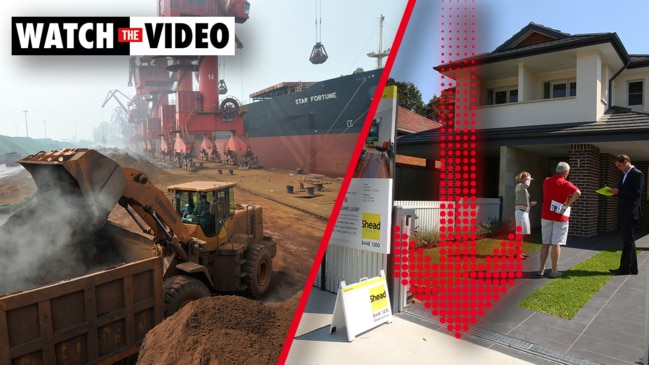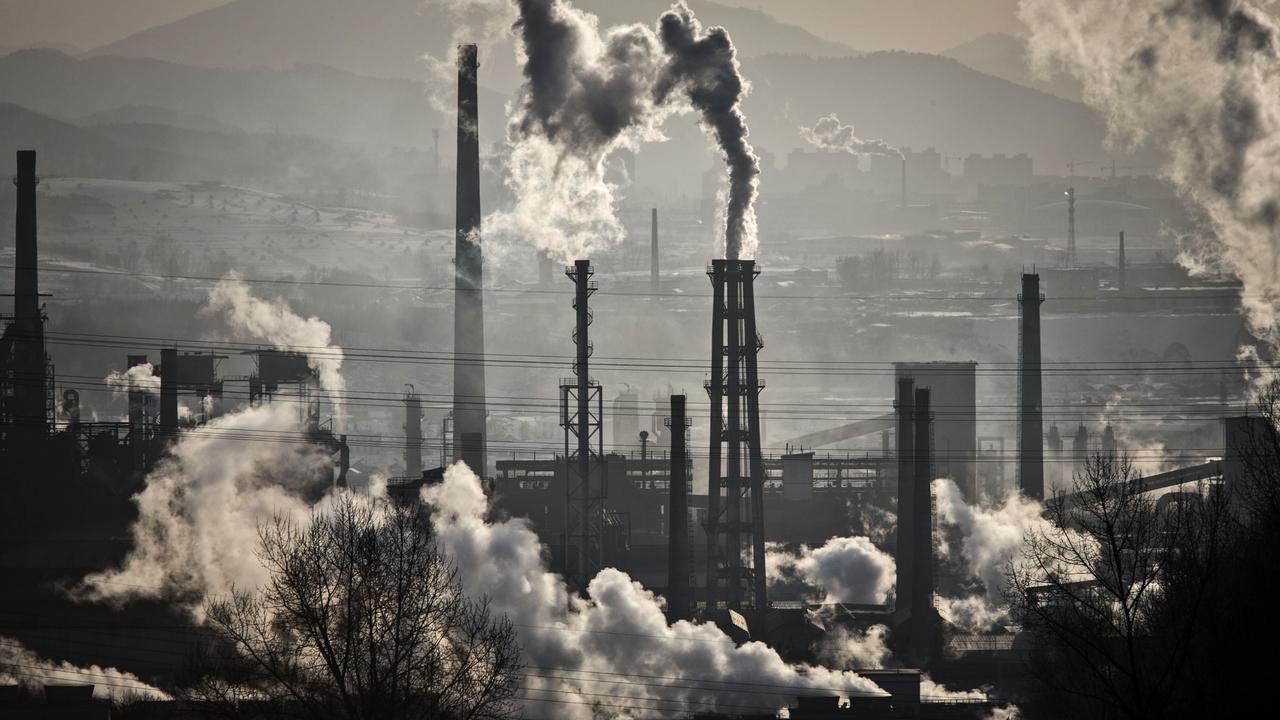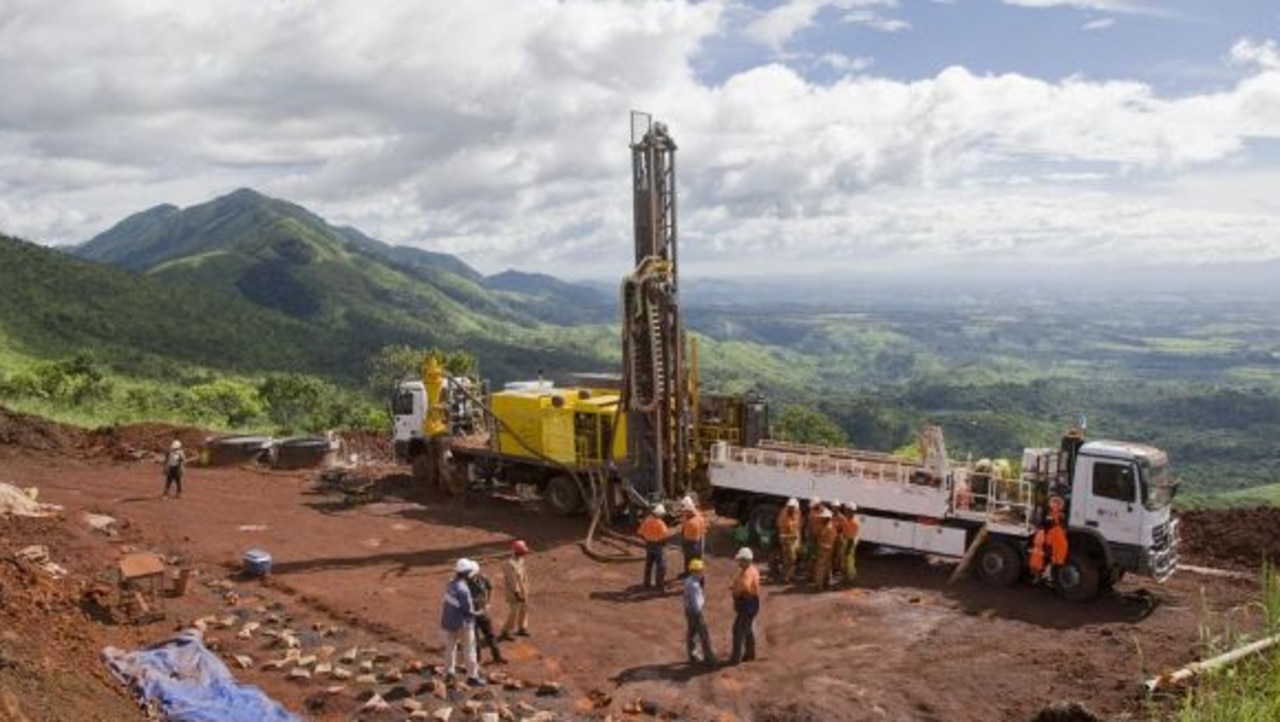US could put aircraft carriers off Australia’s coast to stop China getting our iron ore, says expert
With the world splitting into two distinct parts, America could resort to extreme measures to stop our most valuable asset getting to China.

The world is on a crash course towards a radically new structure – comprising of two giant “liberal” and “illiberal” blocs – putting Australia in a strange but powerful position, an economic expert has claimed.
David Llewellyn-Smith, the editor for Macrobusiness, said these blocs, spearheaded by the US and China respectively, are being forged as differences between both nations become increasingly obvious by the day.
He sees a “Cold War 2.0” style situation brewing and believes Beijing is doing everything it can to turn its back on Australia.
There is just one problem with its plan – iron ore – which China is buying at record levels to make steel part of its pandemic recovery plan.
Despite trying to drive the price of it down, looking elsewhere for it and turning to new technologies to make steel, supplies globally have been tight and China has no choice but to buy it from Australia, at eye-watering prices to boot.
It is for this reason that Llewellyn-Smith says Australia has become a “strategic vulnerability” for China.
The idea is that, despite China flexing its muscles and increasing its military activity against Taiwan, the threat of Australia cutting off their iron ore has become a powerful deterrent.
In a warning about how far the iron ore situation could escalate, Llewellyn-Smith said it might not even be Australia that makes the call to cut China off.
Speaking on the Nucleus Investment Insights podcast last week, he said the US could go as far as “plonking an aircraft carrier” off the coast of Western Australia to stop iron ore getting out if China even suggested invading Taiwan.
RELATED: China’s plan to hurt Australia hits new snag

From friends to enemies
However, he started by giving some important context about how we got to this stage.
Llewellyn-Smith said that Australia and China were once friends, who are now “frenemies” and are well on their way to becoming full-blown enemies.
Despite the criticism from the opposition, he believes this has nothing to do with diplomacy or the Morrison Government in general, but because the differences between the two nations, politically, is too great.
He said the cracks were smoothed over between 2000 and 2011, when China invested heavily in Australian commodities – particularly iron ore.
However, this all came to an end in the years that followed the GFC, when there was a huge bust in Australia’s commodities.
Llewellyn-Smith said that, as a result, the Australian dollar fell away heavily, forcing a massive restructure in our relationship with China.
“From 2013 onwards, instead of us growing our mineral exports to China, we started growing our services exports, our education, immigration, investment into real estate, tourism, food stuffs, wines et cetera,” he said. “It was the mining to dining boom, they said at the time.
“That went fine for a few years, but it was starting to bring with it all sorts of political economic tensions, because what in effect was happening was instead of us exporting stuff to China, we were importing both Chinese people and Chinese capital.
“In effect, what we were importing was influence.”
He said it became clear after a few years that the Chinese Communist Party was starting to buy the views of some Australian politicians. Chinese influence could easily been seen in universities and the media.
“Once the Australian people woke up to this, they pretty much gave it the bird,” he said.
He said that since that happened, the relationship between the two nations has never recovered and is now “unwinding at a really spectacular rate”.
Meanwhile, events across the Pacific have also added fuel to the fire. Donald Trump was seen as an aggressive figure against China, but this year has shown us that Joe Biden isn’t playing soft ball with them either.
His hard line stance against Beijing is being seen as perhaps the only line of continuation from the Trump administration.
RELATED: China’s Aussie bans backfiring badly

Last month, China accused Biden of playing politics and shirking its responsibility in calling for a renewed investigation into the origins of the coronavirus pandemic that was first detected in China in late 2019.
Ever since, Chinese state media has pumped out daily anti-American pieces, and the relations between Beijing and Washington are so bad that the leaders of both nations won’t even talk to each other.
Every week, the USA does something that irritates Beijing. This week, China is angry because the Biden administration sent 2.5 million doses of Moderna Covid-19 vaccine to Taiwan.
– a move China sees as a political ploy as the island continues to snub Chinese mainland vaccines.
Two trade blocs leave Australia in position of power
Llewellyn-Smith said this developing “Cold War 2.0 structure” is escalating and, crucially for Australia, it is changing the world of trade in a big way.
He sees the world effectively splitting into two trade blocs – a “liberal bloc” with the US at the head and an “illiberal” bloc with China at the head.
This currently puts Australia in a strange but powerful position, as China still relies so heavily on us for commodities like iron ore.
“In effect those two blocs are going to compete for geopolitical power and so China simply cannot have a commodity import that is so strategic in the wrong bloc as its supplier,” he said.
“This is a massive strategic veto Australia has over China. China says it’s going to invade Taiwan or does, and Australia cuts off the iron ore. Either we’d elect to do it or the US would simply plonk an aircraft carrier off the Pilbara and it would happen anyway.”
He said this means China has had a reason, like never before in its history, to get away from Australia.

“This is now a strategic vulnerability for China, so it’s essential and it’s urgent,” he said.
Given this urgency, he said China is “very angry” about how high the iron ore price is right now, despite its attempts to bring it down, and it is “humiliated” by its own trade war with Australia.
“Iron ore is just destroying China’s attempt to coerce Australia, because they just need it too much,” he said.
In the first five months of the year China snapped up 444.9 million tonnes. Over 2020, China bought 81 per cent of all the iron ore Australia shipped overseas. The export brings in about $136 billion to Australia’s economy a year.
Last week, it rose to $US222 ($A290) a tonne – its highest level in four weeks – and it has become particularly hard to swallow for China.
On Wednesday, Beijing retaliated by announcing a plan to sell state reserves of copper, aluminium and zinc in an effort to bring commodity prices down.
Commodity prices have taken a bit of a hit since then, with iron ore’s price dropping on Friday and this morning. It is now valued at $US217 ($289) a tonne.
However, it is still too high for Beijing’s liking. The CCP is looking to rapidly expand its scrap steel recycling industry and look to other parts of the world for its iron ore.
China looks to West Africa for iron ore
One place they are looking is in the West African nation of Guinea, where there are plans to create a wildly ambitious mega mine that pumps iron ore directly to China.
The mega mine’s potential is so huge that some commentators have suggested it could completely displace Australian iron ore production tonne for tonne or pump so much additional supply into the market that prices would fall off a cliff.
Either outcome would cripple Australia, which currently makes about $136 billion a year from the export.
However, some experts believe the move will backfire.
Michael Shoebridge, director of defence, strategy and national security at the Australian Strategic Policy Institute, told news.com.au the project has been hit by multiple delays already, and that it was supposed to be online way back in 2015.
RELATED: China’s new $81 billion blow to Australia

“If it does go into production, its scale and output is a fraction of Australian supply and a fraction of Chinese demand. It’s more likely to displace smaller, higher cost suppliers than Australia’s,” he said.
“And it’s a riskier, more difficult, sovereign risk and production environment, which will drive costs higher.”
He said Australian producers should be “alert but not alarmed” by what is happening in Guinea.
“They should also proceed with smart diversification away from the single China market as rapidly as possible,” he said.
“Even without the growing risks from Beijing, Australia needs our ore producers to diversify to clean steel as pressure grows to reduce industrial emissions from steelmaking anyway.”




